Revelation page 2
~ The Study of Threes ~
http://threesology.org

Visitors as of 1st Feb 2020
| Preface page 1 | Preface page 2 | Preface page 3 |
| Preface page 1b | Preface page 2b | Preface page 3b |
| ANC Prologue Page 1 |
ANC Prologue Page 2 |
ANC Prologue Page 3 |
| ANC Prologue Page 1b |
ANC Prologue Page 2b |
ANC Prologue Page 3b |
| Communism and Societal Collapse |
| ANC Epilogue Page 1 |
ANC Epilogue Page 2 |
ANC Epilogue Page 3 |
In my own experiences working with and in the healthcare system, but most particularly as a patient having seen how the Hippocratic oath is often violated by an "it's just business", ethic, I chanced upon the following comment that was created like many of the expressions I have done in my life and portray them as "popping" into my head from seemingly out of nowhere, though some might otherwise suggest them as an illumination colored by some other preferential metaphor more suitable to their own tastes (like a lightbulb over one's head or the Eureka! comment, or labeling it as a whisper from a muse, etc...):
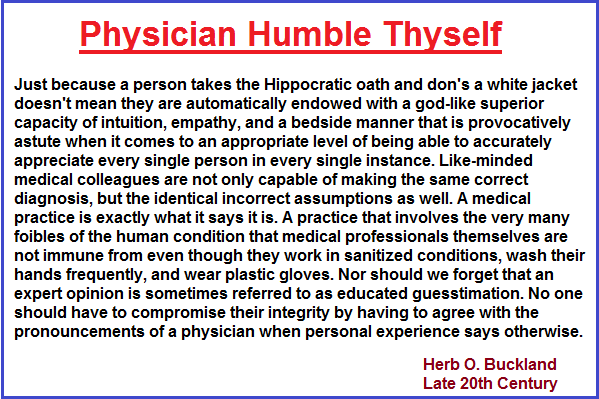
Like the days of old, present authorities in Biology, Psychology and Sociology resemble those who refused to acknowledge any one else's ideas but their own. They are right, in all their disputations and everyone else is wrong; overlooking the fact that the entire society remains in the dark ages. I tell you it's like having taken a time machine into the deep past and become faced with trying to talk sense with so-called experts who rely on the knowledge from reading tea leaves, entrails, and other sorts of mumbo-jumbo that they truly believe represents some great knowledge that they and a few of their select associates fully understand but remains at a distance from most people. No less, this also speaks to the ideology of the average person on the street, though there are a few who, in their own fashion... do exhibit a greater common sense of rationality than the so-called higher authority.
By placing the Sun instead of the Earth at the center, Copernicus's idea came to address motions that were not addressed by the previous Ptolemaic system, and can be used as a metaphor for addressing social issues not adequately being addressed by a system of Sociology and Psychology with schools of thought that put themselves at the center of considerations, leaving us with a problematic social system. It is a system advocated by adherents to suggest that humanity is all important and that Alexander Pope's quote The proper study of mankind is man is just another expressed egocentricity which established the idea that the Earth was at the center of the Universe and continues to rear its head in Biology, Psychology and Sociology. When it is evident that humanity is but another vehicle by which DNA is to be transported in order to increase its chances of longevity, humanity needs to adopt the most prejudicial, discriminatory and biased social functionality against itself in order to establish conditions whereby real human progress can be made beyond the accepted traditions of commerce, politics, science, art and religion. From my perspective, the following excerpt about Copernicus's work is a metaphor describing society and social conditions, that we can note with the following image describing the cult-like orientations of different disciplines and how they see themselves in relation to other ideas within and outside their own subject interests:
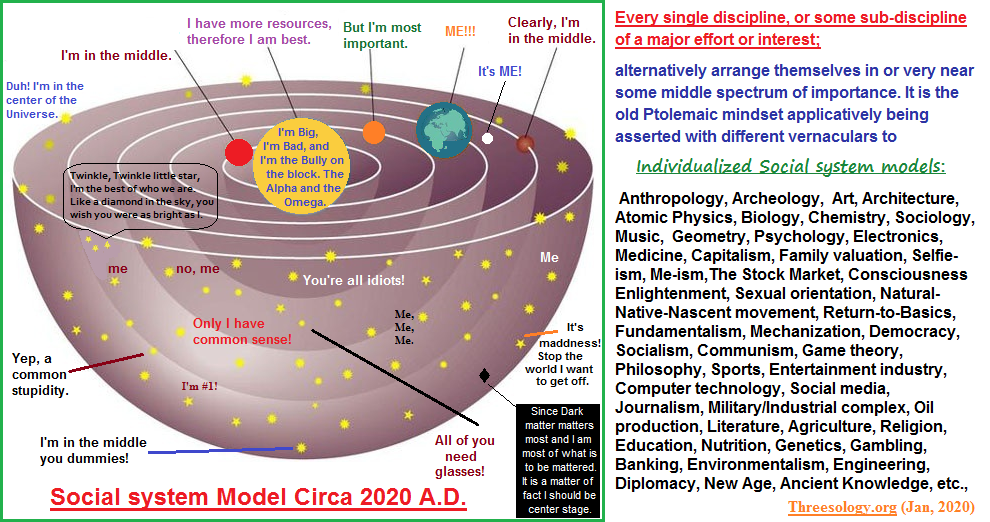
Every single cult, working alone or with other cults such as organized crime, the education system, the government, sports teams, religion, business, etc., develops some rationale by which the public is to pay homage to them via taxes, tithing or price tag. All of them provide the practice illusion of having some measure of insurance for compliance with their rules and those who learn to adapt themselves to a particular specialty within one of the divisions or sub-divisions, is typically rewarded with some compensation whether materially or spiritually or by some other socialized accommodation.
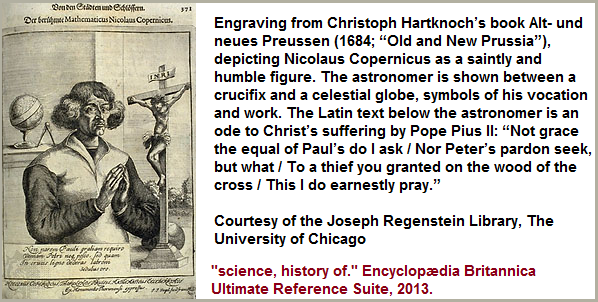
In 1543, as he lay on his deathbed, Copernicus finished reading the proofs of his great work; he died just as it was published. His De revolutionibus orbium coelestium libri VI ("Six Books Concerning the Revolutions of the Heavenly Orbs") was the opening shot in a revolution whose consequences were greater than those of any other intellectual event in the history of mankind. The scientific revolution radically altered the conditions of thought and of material existence in which the human race lives, and its effects are not yet exhausted.
All this was caused by Copernicus' daring in placing the Sun, not the Earth, at the centre of the cosmos. Copernicus actually cited Hermes Trismegistos to justify this idea, and his language was thoroughly Platonic. But he meant his work as a serious work in astronomy, not philosophy, so he set out to justify it observationally and mathematically. The results were impressive. At one stroke, Copernicus reduced a complexity verging on chaos to elegant simplicity. The apparent back-and-forth movements of the planets, which required prodigious ingenuity to accommodate within the Ptolemaic system, could be accounted for just in terms of the Earth's own orbital motion added to or subtracted from the motions of the planets. Variation in planetary brightness was also explained by this combination of motions. The fact that Mercury and Venus were never found opposite the Sun in the sky Copernicus explained by placing their orbits closer to the Sun than that of the Earth. Indeed, Copernicus was able to place the planets in order of their distances from the Sun by considering their speeds and thus to construct a system of the planets, something that had eluded Ptolemy. This system had a simplicity, coherence, and aesthetic charm that made it irresistible to those who felt that God was the supreme artist. His was not a rigorous argument, but aesthetic considerations are not to be ignored in the history of science.
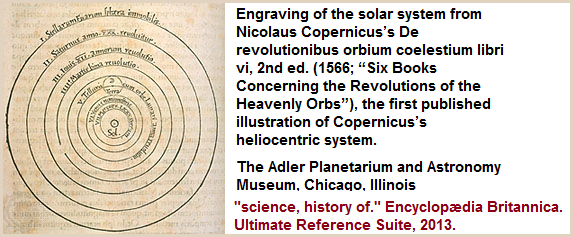
Copernicus did not solve all of the difficulties of the Ptolemaic system. He had to keep some of the cumbrous apparatus of epicycles and other geometrical adjustments, as well as a few Aristotelian crystalline spheres. The result was neater, but not so striking that it commanded immediate universal assent. Moreover, there were some implications that caused considerable concern: Why should the crystalline orb containing the Earth circle the Sun? And how was it possible for the Earth itself to revolve on its axis once in 24 hours without hurling all objects, including humans, off its surface? No known physics could answer these questions, and the provision of such answers was to be the central concern of the scientific revolution.
More was at stake than physics and astronomy, for one of the implications of the Copernican system struck at the very foundations of contemporary society. If the Earth revolved around the Sun, then the apparent positions of the fixed stars should shift as the Earth moves in its orbit. Copernicus and his contemporaries could detect no such shift (called stellar parallax), and there were only two interpretations possible to explain this failure. Either the Earth was at the centre, in which case no parallax was to be expected, or the stars were so far away that the parallax was too small to be detected. Copernicus chose the latter and thereby had to accept an enormous cosmos consisting mostly of empty space. God, it had been assumed, did nothing in vain, so for what purposes might he have created a universe in which the Earth and mankind were lost in immense space? To accept Copernicus was to give up the Dantean cosmos. The Aristotelian hierarchy of social place, political position, and theological gradation would vanish, to be replaced by the flatness and plainness of Euclidean space. It was a grim prospect and not one that recommended itself to most 16th-century intellectuals, and so Copernicus' grand idea remained on the periphery of astronomical thought. All astronomers were aware of it, some measured their own views against it, but only a small handful eagerly accepted it.
In the century and a half following Copernicus, two easily discernible scientific movements developed. The first was critical, the second, innovative and synthetic. They worked together to bring the old cosmos into disrepute and, ultimately, to replace it with a new one. Although they existed side by side, their effects can more easily be seen if they are treated separately...
- L. Pearce Williams- John Stambaugh Professor of the History of Science; Director, Program in the History and Philosophy of Science and Technology, Cornell University, Ithaca, New York. Author of Michael Faraday.
"science, history of." Encyclopædia Britannica Ultimate Reference Suite, 2013.
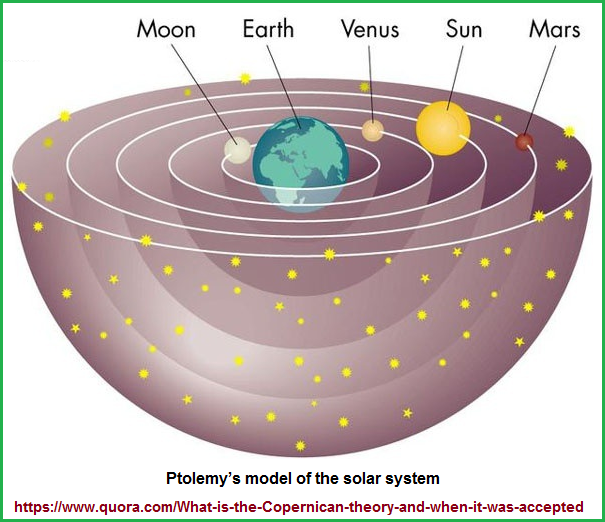

Let us look at some references to the three aforementioned characters, noting again that if the word "discrimination" can be alternatively described with a positive attribute, so can the other two if humanity would be trained to think alternatively by redirecting the power of these three to produce a more beneficial outcome for society. Each of the following are characteristically aligned within a dichotomous framework in the sense that one thing is preferred more than another:
- Prejudice- adverse or hostile attitude toward a group or its individual members, generally without just grounds or before sufficient evidence. It is characterized by irrational, stereotyped beliefs. In the social sciences, the term is often used with reference to ethnic groups (see also racism), but prejudice can exist toward any manner of person or group on the basis of factors that have nothing at all to do with ethnicity, such as weight, disability, sexual orientation, or religious affiliation. ["prejudice." Encyclopædia Britannica Ultimate Reference Suite, 2013.]
- Discrimination- in psychology, the ability to perceive and respond to differences among stimuli. It is considered a more advanced form of learning
than generalization, the ability to perceive similarities, although animals can be trained to discriminate as well as to generalize.
- Application of discrimination procedures permits description of the sensory acuities of laboratory animals. For example, if a dog's salivation response was to be conditioned to a red light by pairing it with food, while a green light was intermittently presented always without food, the dog would salivate to red light but not to green. It then might be inferred that the dog discriminated between colours. If, however, the brightness of the green light was varied, a brightness would be discovered to which the dog salivated. No amount of additional discrimination training with red and green lights would lead to differential response. The conclusion would be that the dog is colour-blind (which, in reality, dogs are). ["discrimination." Encyclopædia Britannica Ultimate Reference Suite, 2013.]
- Bias- (In general: partiality, slanting diagonally, obliqueness.)
- Social psychology:
- Psychological theories emphasized instincts, drives, motives, temperament, intelligence, and human sociability in social behaviour and societal evolution. Social psychology modifies these concepts to explain the broader phenomena of social interaction or small group behaviour. Although American sociology even today retains an individualistic (and therefore psychological) bias, by the 1930s sociologists had concluded that psychological factors alone could not explain the behaviour of larger groups and societies.
- Cultural theory- cultural theories of the 1930s emphasized human ability to innovate, accumulate, and diffuse culture. Heavily influenced by social and cultural anthropology, many sociologists concluded that culture was the most important factor in accounting for its own evolution and that of society. By 1940 cultural and social explanations of societal growth and change were accepted, with economic, geographic, and biopsychological factors playing subsidiary roles.
- Early functionalism:
- Scholars who established sociology as a legitimate social science were careful to distinguish it from biology and psychology, fields that had also begun to generalize about human behaviour. They did this by developing specific methods for the study of society. French sociologist Émile Durkheim (1858–1917), prominent in this regard, argued that various kinds of interactions between individuals bring about certain new properties (sui generis) not found in separate individuals. Durkheim insisted that these "social facts," as he called them—collective sentiments, customs, institutions, nations—should be studied and explained on a distinctly societal level (rather than on an individual level). To Durkheim the interrelations between the parts of society contributed to social unity—an integrated system with life characteristics of its own, exterior to individuals yet driving their behaviour. By positing a causal direction of social influence (from group to individual rather than the reverse, the model accepted by most biologists and psychologists of the time), Durkheim gave a much-needed framework to the new science of sociology. Some writers called this view "functionalism," although the term later acquired broader meanings.
- Durkheim pointed out that groups can be held together on two contrasting bases: mechanical solidarity, a sentimental attraction of social units or groups that perform the same or similar functions, such as pre-industrial self-sufficient farmers; or organic solidarity, an interdependence based on differentiated functions and specialization as seen in a factory, the military, government, or other complex organizations. Other theorists of Durkheim's period, notably Henry Maine and Ferdinand Tönnies, made similar distinctions—status and contract (Maine) and Gemeinschaft und Gesellschaft (Tönnies)—and predicted that civilization would progress along the lines of specialization, contractual relations, and Gesellschaft.
- Later anthropologists, especially Bronislaw Malinowski and A.R. Radcliffe-Brown, developed a doctrine of functionalism that emphasized the inter-relatedness of all parts of society. They theorized that a change in any single element would produce a general disturbance in the whole society. This doctrine eventually gained such a following among social anthropologists that some advocated a policy of complete noninterference, even with objectionable practices in preliterate societies (such as cannibalism or head-hunting), for fear that eliminating the practice might produce far-reaching social disorganization.
- Social psychology:
(While the above excerpt does not mention the term "butterfly effect" let us make note of it as a product of conceptualization that did not have a prominence of consideration before this era.)
However, as the discipline of Sociology began to develop over the decades, there arose conflicts within Sociology which fractured it into several disciplines, because it, like Psychology, embraced its own litany of dichotomous orientations one of which was that between the functionalist/theoretical approach and empirical studies such as the development of statistical analysis.
- One of the consequences of the functionalist-conflict divide, recognized by the 1970s as unbridgeable, was a decline in general theory building. Others were growing specialization and controversy over methodology and approach. Communication between the specialties also diminished, even as ideological disputes and other disagreements persisted within the specialty areas. New academic journals were introduced to meet the needs of the emerging specializations, but this further obscured the core of the discipline by causing scholars to focus on micro-sociological issues. Interestingly, theory building grew within the specialties—fractured as they were—especially as international comparative research increased contact with other social sciences.
- That structural-functional emphasis changed in the 1960s, however, with new challenges to the functionalist notion that a society's survival depended on institutional practices. This belief, along with the notion that the stratification system selected the most talented and meritorious individuals to meet society's needs, was seen by some as a conservative ideology that legitimated the status quo and thereby prevented social reform. It also ignored the potential of the individual within society. In a response to the criticism of structural-functionalism, some sociologists proposed a "conflict sociology." In this view, the dominant institutions repress the weaker groups. This view gained prominence in the United States with the social turmoil of the civil rights struggle and the Vietnam War over the 1960s and '70s and prompted many younger sociologists to adopt this neo-Marxist view. Their interpretation of class conflict seemed consistent with the principal tenet of general conflict theory: that conflict pervades all of society, including the family, the economy, polity, and education.
- The early schools of thought each presented a systematic formulation of sociology that implied possession of exclusive truth and that involved a conviction of the need to destroy rival systems. By 1975 the era of growth, optimism, and surface consensus in sociology had come to an end. The functionalist-conflict debate signaled further and permanent divisions in the discipline, and virtually all textbooks presented it as the main theoretical divide, despite Lewis A. Coser's widely known proposition that social conflict, while divisive, also has an integrating and stabilizing effect on society. Conflict is not necessarily negative, argued Coser in The Functions of Social Conflict (1936), because it can ultimately foster social cohesiveness by identifying social problems to be overcome. In the late 1970s, however, attention to other, everyday social processes such as those elaborated by the Chicago School (competition, accommodation, and assimilation) ceased appearing in textbooks. In its extreme form, conflict theory helped revive the critical theory of the Frankfurt School that wholly rejected all sociological theories of the time as proponents of the status quo. These theoretical divisions themselves became institutionalized in the study and practice of sociology, which suggested that debates on approach would likely remain unresolved.
Itemized excerpts from:
- Robert E.L. Faris- Professor of Sociology, University of Washington, Seattle, 1948–73. Editor of Handbook of Modern Sociology.
- William Form- Full Professor Emeritus, Ohio State University.
"sociology." Encyclopædia Britannica Ultimate Reference Suite, 2013.
As a result of all the bickering, the present uses of Biology, Psychology and Sociology contribute to a situation in which progress for global humanity is stuck in the mud spinning its wheels, with everyone thinking they know how best to get humanity back on the road. They do not collectively see humanity as a singular collective, but as a collection of singularities.
In all instances of progress we can note the presence, the absence or the intermittent appearance and activity of some prejudice, some discrimination or some bias, though some view these three as mere gradations of the same underlying exercise of that which has become defined as a harmful attitude directly opposed to achieving anything desirable. However, it is not prejudice, not discrimination, not bias which is at fault. Just as it is not the fault of Capitalism for so many terrible conditions humanity has been faced with. For all of these are merely tools. Tools that more often than not fall into the hands of those with individualized interests. This is the same for those who want to infect the public with the notion that Big Government is bad for the people. Whereas in fact in a true Democracy, a true Socialism and a true Communism, the government is the people; and a nation of millions represents a very large government. Those who are against a Big Government are against having a Democracy or a Socialism or a Communism. They prefer that government be run by a few so as to better individualize the resources of a nation for selectively individualized interests. They think they know better and by extension view themselves as being the public's Betters whom the citizens should defer and pay homage to with gratitude and recognition that they are so highly thought of that they are thus privileged to have someone such as them desiring to be their leaders. This is their underlying self-centered attitude.
Every religious belief, every business practice, every political ideology is that which expresses prejudice, discrimination and bias, despite the usage of language to conceal the presence thereof by way of one formula of minimization or another. The only way in which humanity can achieve the long sought after Utopia is by way of exploiting humanity's abilities to be prejudicial, discriminatory and biased. For in these three is great strength, great power, great perseverance and fortitude to achieve that which has alluded humanity for centuries. However, the exploitation must be carried out in a collectivized manner. Trouble occurs when prejudice, discrimination and bias become individualized. Humanity must learn to collectively exploit its prejudices, its discriminations, and it biases. If we argue against this by claiming that the usage of love, kindness, compassion and other similarly referenced virtues are better attributes to be exploited, such identities are not recognized for what they actually are. They are the garments humanity has clothed different prejudices, different discriminations and different biases. In order to love one person or one thing more than another, we have to be prejudiced, we have to discriminate, we have to practice a bias. Everything we love, like and desire comes by way of some typically unacknowledged or unspoken of prejudice, discrimination or bias. This is the type of creature humanity is. It likes to play make-believe, dress-up and use affectations which cosmetically alter the appearance of something to give it the impression of another. Instead of intellectual honesty and sobriety we have been taught to delude ourselves, to inebriate ourselves, to contrive illusions.
Humanity is a species which practices various forms and formulas of prejudice, discrimination and bias. Let us not shield ourselves from this fact of life. It is a Natural law we must come to embrace and teach ourselves how to collectively exploit, instead of pursuing along the present course of creating institutions which develop laws, programs, rules-of-thumb, standard-operating-procedures, polices, requirements, and the like which adopt rationales permitting individuals to stack the deck of accepted social practices by which they are individually advantaged. Their exploitations of the public must become exploited into irrelevance.
Only by seeking to maximize its prejudices, its discriminations, the full breadth, depth and length of its biases can humanity every hope to achieve the Utopia of a "Communated" communalism called a communistic commonism. Whereas Democracy and Socialism seek to deprive humanity of its uniqueness, only a true Communism will permit itself to exploit itself to achieve that very promise of a unified greatness which humanity deserves for itself to be experienced first hand, and not by some Representative vicariousness all other socio-political motivations give pretensions of through manipulations that want humanity to sacrifice it true self, its higher calling, its foremost purpose yet to be achieved.
The greatest Communism of humanity is in a concerted effort to establish an expressed practice of its most finely tuned discriminations. To do otherwise is antithetical to its body, mind and spirit.
Present day institutions artificialize humanity's perfectibility so as to prejudice the collective attempt of its desire to develop a global community which may achieve a commonness for exploiting what it is in order to achieve its greater potential, which present institutions of commerce deny due to a practice of globally individualized prejudices, discriminations and biases, and not a globalized practice of a collectivized effort. The different sports, entertainments, banking institutions, market place orientations, religions, governments, etc., are individualized prejudices of human exploitation. They are not collectivized efforts which can better serve humanity in helping it achieve its truer purpose, which can not be defined by present individualized standards. We must collectively prejudice our discriminating biases and move beyond our present individualized efforts.
All our prejudices, discriminations and biases are presently practiced like a scattered rainbow of colors. History has provided us with characterizations of what humanity can achieve when such prejudices, discriminations and biases are collectivized. When humanity collectivizes individual prejudices, discriminations and biases it seeks to blaze the trail of progress, only to fall short when such a mood becomes individualized by singular interest motivations. Humanity must collectivize all its prejudices, discriminations and biases against humanity in order that it may collectively progress so long as it doesn't permit individualized interests to fray the collective focus. Periods of human progress are expressions of the power which a collectively focused prejudice, discrimination and bias can achieve. Unfortunately, such expressions have primarily been individualized. They are a singular focus by a collected few, and not the collective focus of a singular many.
Date of Origination: Saturday, January 11th, 2020... 7:07 AM
Initial Posting: Saturday, February 1st, 2020... 1:26 PM
Herb O. Buckland
herbobuckland@hotmail.com